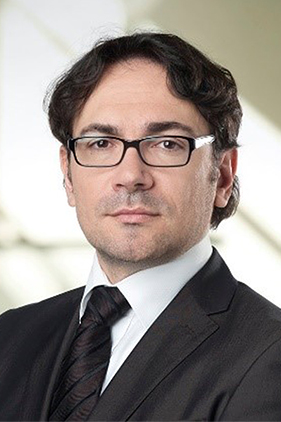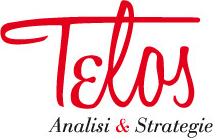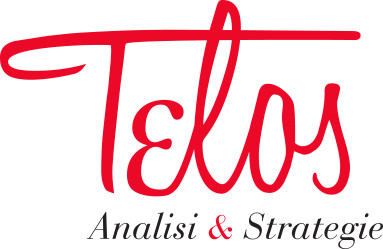March 2016, Year VIII, no. 3
Sacha Polverini
An Italian at the Court of King Gates
“A foundation tends to look more at the longer term, at the bigger picture. The objectives are the great humanitarian or environmental causes. A foundation promotes changes through persuasion, bearing in mind that most initiatives need to be profitable, to be sustainable and impactful in the longer term.”
Telos: The commitment of the Bill & Melinda Gates Foundation is widely known, whereas that of the Financial Services for the Poor Program FSP is surely less. Could you tell us what is the FSP Program’s mission and the role you play in it?
Sacha Polverini: The Gates Foundation’s FSP Program aims at promoting access to basic and affordable financial services to the poorest segments of the world’s population. According to the World Bank’s latest figures (2014) 2bn people living on under $2 per day do not have access to formal financial services like savings, loans and insurance which we now give for granted in our life. A growing body of evidence indicates that access to the right financial tools at critical moments can determine whether a poor household can capture an opportunity to move out of poverty or absorb a shock without being pushed deeper into poverty. However, the poor’s immersion in cash perpetuates their marginalisation from the financial system by making it prohibitively costly for banks, governments, and other institutions to transact with them. Poor people tend to transact in tiny amounts, so financial institutions can’t profit by serving them in the same way they serve better-off customers: in big buildings with security guards, tellers, and reams of paper files. But an emerging digital economy, conducted largely via mobile phones, has the potential to lower transaction costs to near zero. As mobile-phone ownership and cellular-signal coverage increase throughout developing countries, it will be easier for banks and other providers to offer affordable financial services to the poor in a profitable way. What’s more, they’ll be able to design new products for this new market: financial services tailored to the unique needs of customers with limited incomes. But in order to successfully tackle the financial exclusion problem, three elements must be in place: 1) smart policies and regulations that enable innovative business model while protecting users; 2) scalable, low-cost, interoperable, fraud resistant payment infrastructure that extends into poor and rural and remote communities; and 3) poor people using this infrastructure to access digital financial services (DFS) which provide them pathways out of poverty. Of the three elements mentioned above, I am responsible of the first one; global policy and regulation. My role is to engage, inform and work with senior policy and decision makers to develop an enabling regulatory environment that allows DFS providers to innovate and compete on the same ground. As DFS are considered financial services but are increasingly offered by non-financial entities like Telco operators or e-commerce providers, regulators find it challenging to apply the traditional banking or financial rules to products and services that look different and are offered through unconventional channels.
How do you measure success in your work?
This is a $1M question, particularly for policy and advocacy activities undertaken. In most cases it is difficult to establish a proper cause-effect link between what we do and the results obtained. We can certainly say we have contributed to the final outcome but being able to attribute merits for a certain result is much more difficult. It is certainly easier to assess the number of people vaccinated or the impact of new drugs than the drivers behind a policy change. In our work at the foundation we try to be as rigorous as possible even when we engage in more intangible policy and advocacy activities. All programs and initiatives have now widely adopted the principle of developing a comprehensive results framework, with clear and distinct outcomes, outputs and indicators that can allow the foundation to regularly calibrate its activities and asses both intermediate and final results. It is not an easy exercise but it essential for measurement, learning and evalutation purposes and to foster accountability.
Among your various activities, you chair a taskforce on the digital financial services at ITU. It seems surprising to find a group of experts dealing with financial inclusion in an organisation like ITU. Could you explain us its origins and objectives?
The ITU, the UN agency in charge of Information and Communications Technologies (ICT) is mostly known for its standardisation activities and radio spectrum allocation. The Union however increasingly looks at how ICTs can be applied to support developing countries reaching their objectives in the field of agriculture, education, women empowerment and also financial inclusion. As mentioned earlier, regulation plays a critical role in the development of a secure and competitive DFS ecosystem for the poor. Without proper, functional regulation the market is unlikely to develop organically. Today, policy and decision makers are challenged by a fast moving, hyper technological environment and increased collaboration between various regulatory authorities is crucial to develop the right regulatory framework. The ITU Focus Group on DFS has therefore a threefold objective: a) foster collaboration and increase dialogue between financial services and telecommunications regulators, clarify their respective roles and responsibilities in the DFS field to minimise the risk of regulatory arbitrage or legal void; b) address some of the key regulatory and policy issues currently preventing the development of an open, secure and interoperable DFS ecosystem with a particular (though not exclusive) focus on areas where financial services and Telco regulators overlap and c) provide policy and decision makers in developing countries with additional tools to advance the financial inclusion agenda and fast track policy reform.
Your career’s first 20 years were devoted to Public Policy and Government Affairs activities for close-up companies, while you are now committed to advocacy activities for a charitable foundation. Similarities and differences?
When we look at Public Policy and Government Affairs, we face a large spectrum of activities that involve public and private sector entities including not-for-profit organisations. In most cases, the main, general objectives are fundamentally the same: to inform and educate policy and decision makers, raise awareness, provide a voice to the civil society, shape the debate, promote reforms and many others. That being said, there are major differences from the goals pursued, the approach taken and the tools used by corporations and charitable organisations. Looking at the private sector, most public policy activities are ultimately aimed at protecting and/or increasing shareholders value by allowing corporations to either maintain or increase their position in the market. These are most of the time very legitimate goals. The focus tend to be more on the short term, the pace faster, the tone is assertive, the engagement direct. A foundation on the other hand tends to look more at the longer term, at the bigger picture. The objectives are the great humanitarian or environmental causes. A foundation promotes changes through persuasion, it operates through partnership always bearing in mind that most initiatives need to be profitable, to be sustainable and impactful in the longer term, particularly when philanthropic capital is exhausted.
Editorial
“My full-time work will be the foundation for the rest of my life”. After categorically ruling out a return to the helm of Microsoft, Bill Gates is now focusing on much more noble challenges with his usual incisiveness and determination. Our interviewee Sacha Polverini, an Italian at Gates’ court, confirms that efficiency is the strong point of the Bill and Melinda Gates Foundation, the biggest charitable association in the world, managed with the same engineering forma mentis of its founder. Polverini explains that most of the Foundation’s 1,200 employees are involved in meticulously calculating the impact of every dollar spent, as well as impressing its standards on all the projects it finances worldwide. While we think we know all about the Foundation’s activities, Polverini instead reveals several truly interesting and novel features. Gates, however, is not the only philanthropist. The last in line is Mark Zucherberg who has decided to donate 99% of his Facebook shares to charity (roughly 45 billion dollars). So what does philanthropy mean in the USA? How does the concept of the moral of the estates of big American philanthropists differ from the situation in Europe? The keyword seems to be give back: to give back to society part of the wealth that an individual has accumulated thanks to the support received from that society. For example: “our responsibility is to give back most of our wealth” (the Gates); “those who have benefited most from our economic system have a special responsibility, to give back to our society” (Rockefeller), and “work hard every day to give back” (Turner). To pay back a debt to society is the rationale behind US philanthropy; it is a radically different approach compared to Europe where, albeit with substantial differences from country to country, the concept does not exist. The Giving Pledge, started in 2010 by Bill Gates and Warren Buffet, is paradigmatic: a commitment by the world’s wealthiest individuals and families to donate half of their wealth to philanthropy. The result? In one year in the US the Giving Pledge was signed by 69 multimillionaires many of whom committed to donating much more than half: up to 100% of their wealth. And yet, not one foreigner has subscribed to the Giving Pledge. Two famous French multimillionaires, Arnaud Lagardère and Liliane Bettencourt, refused to sign the Pledge. Attempts personally initiated to get rich entrepreneurs in India and China on board, also met with failure. Finally, Carlos Slim, the Mexican entrepreneur who in the last two years has robbed Bill Gates of the title of the richest man in the world, gave this answer when asked to sign the Pledge: rather than playing Father Christmas, entrepreneurs can help society by creating companies and therefore employment. Is that clear?

Sacha Polverini joined the Bill & Melinda Gates Foundation’s Financial Services for the Poor (FSP) team in December 2012 as Senior Program Officer - Global Policy and Regulation. In this capacity, Sacha represents FSP and the Gates Foundation on policy & regulatory related aspects with a large variety of stakeholders including governments, International Standard Setting Bodies, global organisations, grantee organisations and donors. The Financial Services for the Poor team works with a wide range of public and private sector partners to foster the development of digital financial services - such as mobile money - that can reach hundreds of millions of people with the financial tools they need to mitigate risks and capture opportunities to move out of poverty. Since June 2014, Sacha chairs the International Telecommunications Union’s Focus Group on Digital Financial Services. Sacha joined the Foundation from Brussels where he lived and worked for almost 20 years representing the interests of the financial services industry before both the EU and national policy and decision makers. Sacha worked - inter alia - at Barclays Bank PLC as Group Director for EU public Policy and at Genworth Financial Mortgage Insurance (formerly GE Mortgage Insurance) as Managing Director of Government and Regulatory Affairs Europe. A graduate of University LUISS Guido Carli in Rome, Sacha holds a Master’s degree in European Political Studies from the Université Libre de Bruxelles. In addition he has completed a post-graduate management program at Solvay Business School, Ècole de Commerce de Solvay, Brussels. Sacha is a passionate artist, abstract painting is his hobby or even a little bit more. In fact he exhibited his artworks in Belgium, Tanzania and US.







SocialTelos